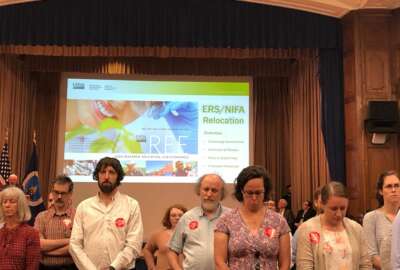
ERS union demands hold on USDA relocation until agency bargains with employees
A newly formed collective bargaining unit representing employees at the Agriculture Department's Economic Research Service has demanded USDA delay any relocatio...
Best listening experience is on Chrome, Firefox or Safari. Subscribe to Federal Drive’s daily audio interviews on Apple Podcasts or PodcastOne.
The local union representing employees at the Agriculture Department’s Economic Research Service is demanding the agency begin collective bargaining negotiations over its planned relocation to Kansas City.
The local, which formed last month under the American Federation of Government Employees in large response to USDA’s plans to move headquarters for ERS and the National Institute of Food and Agriculture, has formally asked to bargain over the relocation.
“The union hereby proposes to have all bargaining relating to this subject conducted within the context of an agreed-upon ground rules and to have all implementation of the relocation be held in abeyance until ERS has fulfilled its collective bargaining obligations,” Peter Winch, a special assistant to the national vice president at AFGE, wrote in a June 18 letter to USDA. “This would include a freeze on all individual relocation decisions until after bargaining is completed.”
USDA Secretary Sonny Perdue announced last week the department had chosen Kansas City as the site for the new ERS-NIFA headquarters. He described Kansas City’s lower cost of living, shorter employee commute times and proximity to other land grant and research universities as the justification for the decision.
NIFA employees voted two days before last week’s announcement to form a collective bargaining unit.
ERS and NIFA employees received reassignment notices in tandem with USDA’s announcement last week. Of NIFA’s 315 positions, 294 employees will relocate to Kansas City and 21 will remain in the national capital region. Of ERS’ 329 positions, 253 will relocate and 76 will stay in the Washington area. Employees can choose to relocate to Kansas City. If they don’t elect to move, they risk losing their job at the agency.
The department said it expected the first 100 employees would move to Kansas City by Aug. 1, with an additional 200 expected to relocate a month later. USDA said all 644 ERS and NIFA employees will move by Sept. 30.
Yet the ERS union is demanding a hold on the relocation until USDA comes to the bargaining table and addresses 10 proposals.
“ERS has and will continue to engage with the union throughout this process,” a USDA spokesperson said when asked about the union’s demands to bargain.
Specifically, the union wants the Economic Research Service to conduct a civil rights impact analysis for the relocation, which would focus on the move’s impact on employees who don’t choose to move but have worked for the agency for most of their careers, don’t have a college degree and may find it difficult to find another similar-paying job somewhere else.
The union is also asking that USDA provide written confirmation to employees that the department will pay relocation expenses, which should include:
- Round trip transportation for employees and their spouses to look for a house in the region,
- Transportation of the employee to the new work site,
- Subsistence expenses for the employee’s immediate family to travel between the old and new official work stations,
- Shipment of household goods,
- Temporary storage of household goods,
- Real estate expenses incurred in home sales and purchases,
- A home marketing incentive,
- Property management expenses if the employee isn’t selling a home,
- Shipment of an employee’s privately owned vehicle, and
- Temporary quarters subsistence.
In addition, the union has proposed ERS provide all employees who have chosen to relocate an incentive payment that’s 25% of their basic pay.
The union has also asked that employees who don’t choose to relocate receive priority consideration for other research positions at USDA.
Other bargaining proposals suggest USDA should allow relocating employees access to one year of remote telework. The union recommends this telework should be accomplished “from any location in the United States, and the employee’s work site shall be the location of the employee’s telework site.”
The union also weighed in on the uncertainty surrounding USDA’s current timeline and space in the Kansas City region.
It wants ERS to “supply a like and comparable office space to the existing space in Washington for all ERS employees agreeing to relocate, or, in the alternative, that all 100 seats for ERS employees at the relocation site be reserved for bargaining unit employees,” the letter reads.
USDA does own a facility in Kansas City, Missouri, which Perdue said could temporarily house some 200 employees this summer while the department continues the leasing process with the General Services Administration for a permanent facility.
Perdue said the agency would allow employees to start the move in July to give families more time over the summer to relocate their children and find new schools.
In explaining its rationale for the relocation to Kansas City, USDA said the move would save roughly $300 million over the next 15 years.
Economists with the Agricultural and Applied Economics Association (AAEA), however, reviewed USDA’s cost-benefit analysis and objected to the department’s savings.
The association estimated the USDA relocation would cost taxpayers $37-to-128 million, because the department didn’t factor in the costs and lost value of institutional knowledge from the employees who decide to leave the agency instead.
According to AAEA, some 50-to-70% of ERS and NIFA employees are considering to opt out of the relocation.
“We further assume that USDA will be able to rehire only one quarter of them per year and that the replacement employees will take approximately four years to reach the level of expertise and research productivity of the researchers they replace. Employees who do move suffer a 25 percent reduction in productivity during their first year as they buy and sell homes, find new schools and places of worship, and adjust to new settings,” AAEA said Wednesday in a report on USDA’s proposed relocation.
The AAEA also disputed USDA’s comparison of lease costs. It argued the department didn’t consider the possibility of moving ERS and NIFA headquarters to facilities with less expensive leases and only compared the current, cost lease with estimates in Kansas City.
Copyright © 2024 Federal News Network. All rights reserved. This website is not intended for users located within the European Economic Area.
Nicole Ogrysko is a reporter for Federal News Network focusing on the federal workforce and federal pay and benefits.
Follow @nogryskoWFED






